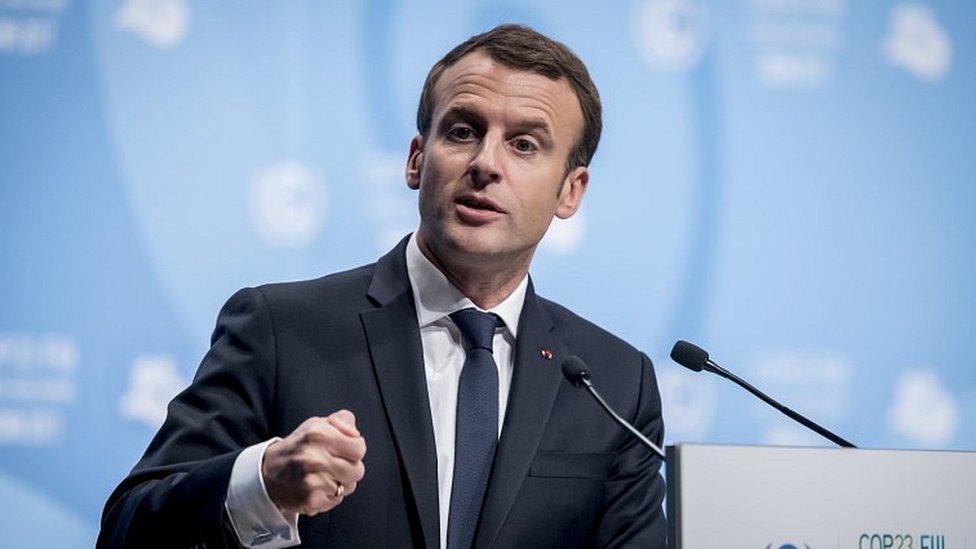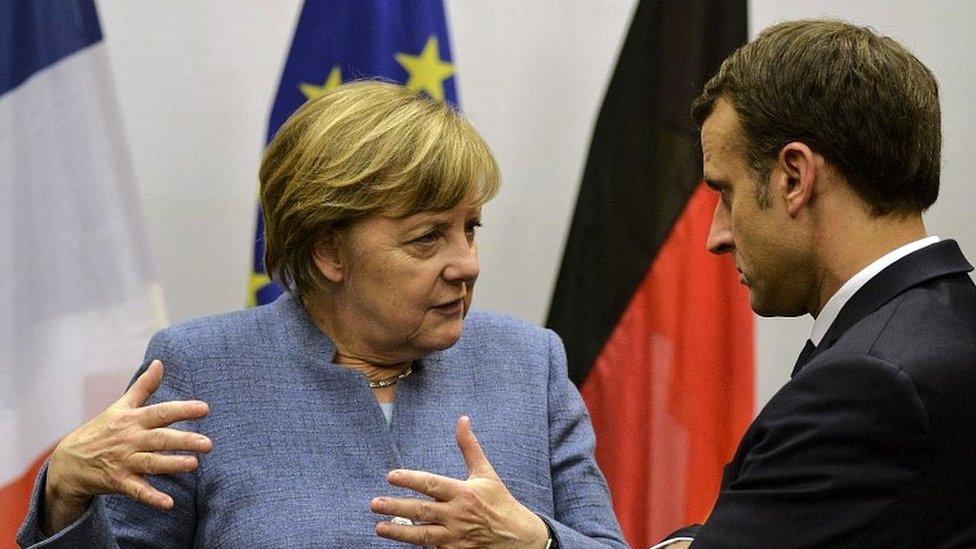Europe steps in to cover US shortfall in funding climate science
- Published

French president Emmanuel Macron says that Europe will cover any shortfall in funding for the global climate body, the IPCC.
The scientific organisation, external has faced uncertainty since President Donald Trump outlined plans earlier this year to cut US funding.
The UK government also pledged to double their IPCC contribution.
Speaking at UN talks in Bonn, Mr Macron said that climate change was the most significant struggle of our times.
Today saw the start of the high level segment at this meeting of global climate negotiators known as COP23, external.
In his statement to negotiators, the French president outlined the need for increased commitments to cut carbon.
Trump team looks for climate alternatives
Mr Macron said these decisions must be based on clear scientific information.
The Intergovernmental Panel on Climate Change (IPCC) has long been seen as a key element of that system of advice to governments.
Meeting the challenge
Their assessment reports, which come out every six or seven years, are critical in informing the public and governments about the causes and impacts of climate change.
Earlier this year, President Trump proposed ending US funding for this body, external. Mr Macron said that Europe would now fill the gap.
"I propose that Europe replace America, and France will meet that challenge," he told delegates here in Bonn.
"I would like to see the largest number of EU countries at our side, all together we can compensate for the loss of US funding but I can guarantee from the start of 2018, the IPCC will have all the money that it needs and it will continue to support our decision-making. They will not miss a single euro."
The UK also announced that it would help the IPCC financially, with the Department for Business, Energy and Industrial Strategy (BEIS) announcing a doubling of funding for the organisation.
Allow X content?
This article contains content provided by X. We ask for your permission before anything is loaded, as they may be using cookies and other technologies. You may want to read X’s cookie policy, external and privacy policy, external before accepting. To view this content choose ‘accept and continue’.
Mr Macron was keen to reinforce the leadership of France and the European Union on climate change. He announced that France would close all its coal plants by 2021, putting him at odds with German chancellor Angela Merkel who struggled with this issue as she tried to form a coalition government.
On renewable energy, Mr Macron outlined plans for projects that would build inter-connections between green energy producers and consumer across the continent.
"We will encourage and actively participate in funding all the projects we need bilaterally, with Germany and France but also with Ireland, Spain, Italy, the Benelux countries and Portugal,"
"These international interconnections will be aimed at utilising renewables most efficiently across our continent, throughout the EU,"
"This will be a guarantee that we will accelerate a reduction of greenhouse gas emissions."
Earlier UN secretary-general Antonio Guterres had addressed the conference of the parties for the first time in his new role. He used the opportunity to call for greater investment in green energy - and an end to subsidies for coal, oil and gas.

Macron's stance on coal puts him at odds somewhat with the German chancellor Ms Merkel
"In 2016, an estimated $825bn were invested in fossil fuels and high emissions sector," he told the meeting.
"We must stop making bets on an unsustainable future that will place savings and societies at risk."
Other leaders and senior ministers were scheduled to address the talks on Thursday amid progress across a raft of technical issues, including the wish of poorer nations to see more action from the richer states in the years before 2020, when the Paris pact kicks in.
There was also some good news from researchers who track the commitments of countries to cut their carbon emissions.
Scientists involved with the Climate Action Tracker, external said that while the decision of President Trump to withdraw from Paris would impact US commitments, their analysis showed that on the ground actions in India and China were making a difference in curbing emissions.
The report shows that the projected temperature rise facing the world by 2100 had dropped to 3.4C compared to 3.6C a year ago.
"It is clear who the leaders are here," said Bill Hare of Climate Analytics, part of the team the group that put the tracker together.
"In the face of US inaction, China and India are stepping up."
"However, both need to review, and strengthen, their Paris commitments. Our projections show they will meet them much earlier than 2030."
Follow Matt on Twitter, external and on Facebook, external